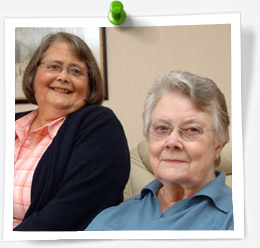Betty Whyteside
Betty Whyteside well remembers the days before the NHS when a visit from the doctor would cost half a crown – a sizeable part of the weekly budget.
“You didn’t get the doctor unless you could really help it,” recalled 84-year-old Mrs Whyteside. “My grandmother had all sorts of remedies – she would slap a poultice on your chest to stop you coughing. That’s what things were like back then.”
“My grandmother had all sorts of remedies – she would slap a poultice on your chest to stop you coughing. . . .”
The NHS changed all that and Mrs Whyteside was soon to be grateful for the help it provided. Her eldest daughter, Margaret, developed kidney problems at the age of four involving regular trips to Yorkhill Hospital in Glasgow.
This was in the 1950s when little could be done for such problems. Margaret was given regular blood transfusions but, although they gave temporary relief, they did not offer a lasting solution. Sadly, Margaret died in 1958, at the age of 10.
“I could not fault the care we got at Yorkhill. They were brilliant,” said Mrs Whyteside.
Unfortunately, the family was not finished with hospitals. When her other daughter, Joan, had a convulsive fit, Mrs Whyteside feared the worst. Margaret had suffered similar seizures and it was later confirmed that Joan also had a kidney problem.
By this time the family was living in Aberdeen and doctors tried to treat the problem by putting Joan on a strict diet. While her friends were eating chocolate and crisps, 15-year-old Joan was having to make do with specially made bread, pasta, meat and vegetables.
On returning to Glasgow, it was decided that the diet was not working. A biopsy revealed that the condition of Joan’s kidneys had deteriorated. Fortunately, medical science had moved on in the decade since Margaret’s death. Kidney dialysis and kidney transplants were now possible.
Joan was put on dialysis and, after a year, was given a transplant. That was in 1972 and today Joan is one of the longest living transplant recipients in Scotland.
Joan spent five weeks in hospital following the transplant but was able to return to work seven months later. She felt better almost immediately and was able to continue working for 26 years before retiring on medical grounds.
She remembered how all the patients in the renal unit helped one another and how families raised funds to improve services. On one occasion, staff presented one of the first transplant recipients with a “bill” for his care as a bit of fun. It came to more than £1000 at a time when you could buy a flat for a few hundred.
Mrs Whyteside has suffered the heartache of losing one daughter but the joy of seeing another survive. “The NHS has made a huge difference to our lives. We would never have managed if we had to pay for this ourselves. The NHS has been a great thing and we are very grateful for it. “

